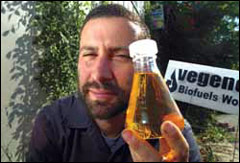If you live in a city of any size, you’ve likely seen them out there: boxy little ’80s-era foreign cars, bumpers adorned with pro-ecology and anti-war slogans, and references to “grease.” Even the fumes they emit may smell different: literally like French fries, in some cases; like generic used vegetable oil in others.

Foh sizzle my fuel-izzle.
Photo: iStockphoto
Welcome to the small-scale biodiesel movement, a grassroots challenge to Big Oil and Big Ag. While corporate giants create fuel by refining crude oil and fermenting corn, these more modest initiatives focus on a feedstock no one else wants: waste cooking grease. And their premise is radical: For them, energy production not only moves cars and heats homes, it also builds wealth and creates jobs in local communities. And the side benefits aren’t bad either: reducing U.S. reliance on foreign oil, and cutting greenhouse-gas emissions in response to global warming.
Often started with crude homebrew equipment in the garage of an enthusiast, some biodiesel cooperatives are now scaling up, capitalized in part by eco-minded shareholders in their own communities. But can they create reliable sources of fuel — and survive in an energy world dominated by giants? In Georgia and Massachusetts, two projects are taking on this challenge in distinctly different ways.
Back to Bass-ics
In 2001, Rob Del Bueno was a bassist in a rock ‘n’ roll band, and owner/operator of Zero Return Studios, an independent recording venue in Atlanta’s downtown Cabbagetown neighborhood. A musician in from California to record happened to mention that his singer-songwriter girlfriend was traveling around the country in a van she’d converted to run on vegetable oil. This chance conversation started Del Bueno down a long and winding road toward renewable-energy activism, powered by biodiesel — fuel for motoring and heating that is sourced from plants, waste vegetable oils, and animal fats, rather than petroleum.

Rob Del Bueno.
Photo: Gwinnett Daily Post
Already environmentally aware and — to understate things thoroughly — no fan of the Bush administration and its Big Oil cronies, Del Bueno found it impossible to resist the prospect of a clean-burning, cheap, and renewable alternative to petroleum-based fuels. Once convinced this crazy story about a girl and her veggie-powered van was true, the Atlanta musician — better known to fans of surf-rock as Coco the Electronic Monkey Wizard of the band Man Or Astro-Man? — became obsessed with the idea.
Del Bueno first scoured the internet, tracking down biodiesel arcana. Next, he started brewing biodiesel in his own kitchen. “I took some vegetable oil, some sodium hydroxide, a little bit of methanol, and started playing with it,” the 34-year-old told Grist. “I decided to buy myself an old beat-up diesel, a 1974 240D Mercedes, and started making the fuel in larger batches and trying to use it in the car. And it was working! It kind of blew my mind.”
Soon Del Bueno was driving around Atlanta in his homebrew-fueled, pro-grease sticker-covered Mercedes, an evangelist with a growing congregation. “Friends would be like, ‘Hey, if I got a diesel, could I get some fuel from you?'” He also connected veg-fuel enthusiasts via a local online forum. “We started having little monthly gatherings — we’d call them ‘bio-b-ques.’ We would get together and hang out, cook some barbeque, and geek out about biodiesel and other bio-based fuels and related issues” — like global warming, the geopolitics of petroleum, and community-based energy production.
By October 2003, when the local alternative weekly Creative Loafing did a cover story on his biofuel exploits, Del Bueno was collecting used fry grease from local restaurants, cleaning it, and selling it as auto fuel at the rate of about 55 gallons a week — some of it to customers whose cars he converted to burn veggie oil himself.
The article brought out a lot of people wanting to buy his fuel, sell him equipment, supply him with grease, or otherwise support biofuel in Georgia, but also some unwanted attention. Del Bueno was, as he puts it, “informed indirectly” by the U.S. Environmental Protection Agency that he faced fines of up to $25,000 per day for running an illegal, unregistered biodiesel manufactory.
Del Bueno initially suspected a plot — “I had all kinds of conspiracy theories about Big Oil and like that” — but came to realize that the EPA had some valid concerns. “There really are some safety issues and some environmental issues” around biodiesel production, he says. Del Bueno spent the next two years trying to figure out what the right scale of operation would be to cover the costs of permitting, insurance, fuel quality testing, and more, in order to go legit, expand his operation, and bring on the Southeast’s biodiesel revolution.
O Pioneers
Meanwhile, 1,000 miles north, some grassroots energy groups in New England realized that in order to survive financially, serve more customers, and build a truly community-owned renewable-power infrastructure, they could do a lot more united than apart. So Pioneer Valley Biodiesel Cooperative, a western Massachusetts purchasing group, and Co-op Plus, an energy co-op serving the region, came together with other community groups in 2004 to form Co-op Power, Inc., which would have an operating area of New York and New England. In short order this new organization formed Northeast Biodiesel and began raising capital to build a biodiesel production facility in Greenfield, Mass.

The Pioneer Valley, a biofuels hotbed.
Photo: iStockphoto
Lynn Benander, a consultant who had been working with regional cooperatives since 1996, helped Co-op Power form. She was impressed with its potential to succeed as a community-based energy producer while also keeping investment capital (and therefore jobs) in the Northeast. “It was the most viable business model that I had seen in this area in that 10-year period,” Benander told Grist. In 2005 she left her consulting job to manage Co-op Power — even though it didn’t have any money to pay staff. The project, still operating largely on volunteer efforts, now has a bare-bones budget of about $35,000 a year.
r touts Co-op Power’s capitalization model: operating across a sufficiently large geographic area that it could eventually recruit enough member/investors, at $975 a share, to generate investment capital sufficient to launch several community-scale renewable-energy projects. “There’s tremendous opportunity for collaboration as we move forward in that way, looking at how to maximize the benefit back to our communities” in terms of jobs and money savings, Benander told Grist. Her vision is expansive: “Net-zero or energy-producing buildings [and] energy-producing communities, instead of energy-draining communities.”
Co-op Power currently works with regional fuel distributors to supply several dozen households in New York and New England with biofuel for home heating and some farm uses at a discount of five to 10 cents per gallon; members also get assistance and discounts on installations of solar energy systems.
Meanwhile, it’s going forward with plans for the Greenfield plant. To finance the facility, Co-op Power has raised member shares of about $125,000, and has scared up around $4 million in loans, $625,000 in federal grants, and $2.1 million from investors.
One investor, Tom Leue, is the president of Williamsburg, Mass.-based Homestead, Inc., which since 1998 has distributed more than 20,000 gallons of biodiesel a year in Vermont and Massachusetts under the moniker Yellow Brand Premium Biodiesel. “Biodiesel is more addictive than oil,” Leue likes to say, alluding to the way it provides power while also recycling waste oils and slashing greenhouse-gas output. Leue says waste-grease biodiesel ultimately releases just five percent of the total carbon dioxide as typical fossil fuels.
The Next Steps
As Co-op Power was getting off the ground in Massachusetts, Rob Del Bueno was struggling to keep Vegenergy, his little fuel-supply operation, afloat in Atlanta. In mid-2005, a customer and friend who had followed his travails revealed that she was on the board of a foundation. Go the nonprofit route, she advised, and her foundation would probably grant him some seed money.
Del Bueno approached the Southern Alliance for Clean Energy, a coalition of Southeastern groups focused on combating global warming, to be his nonprofit conduit to funding; SACE offered to adopt the entire project instead, with him as manager. So since January, Del Bueno’s been working on his dream project: developing a prefab plant that can safely transform waste cooking oil into about 200,000 gallons annually of high-quality biodiesel.
Both this facility and its retail counterpart, which Del Bueno describes as “a kind of automated biodiesel gas station,” are housed in standard-sized shipping containers — 40-foot and 20-foot, respectively. That’s small enough that Del Bueno imagines operators locating the fuel plants on the sites of local chemical facilities, thus piggybacking on existing industrial zoning, while the fueling station can be “dropped into any parking lot, connected to power and phone lines, and [make] biodiesel available via pay-at-pump 24/7” using an ATM-like swipe card.
This overcomes what Del Bueno calls biodiesel’s chicken-and-egg problem: gas stations don’t want to carry it because there is too little demand, and drivers hesitate to buy diesel cars because they can’t easily find the bio-sourced fuel.
With corporate behemoths shifting into biofuels with a vengeance, the fate of projects like Vegenergy and Northeast Biodiesel seems to some as precarious as that of a beat-up old diesel compact car chugging along amid thundering 18-wheelers on the interstate. But just like that time-tested vehicle, these operations may be deft and durable enough to survive.


